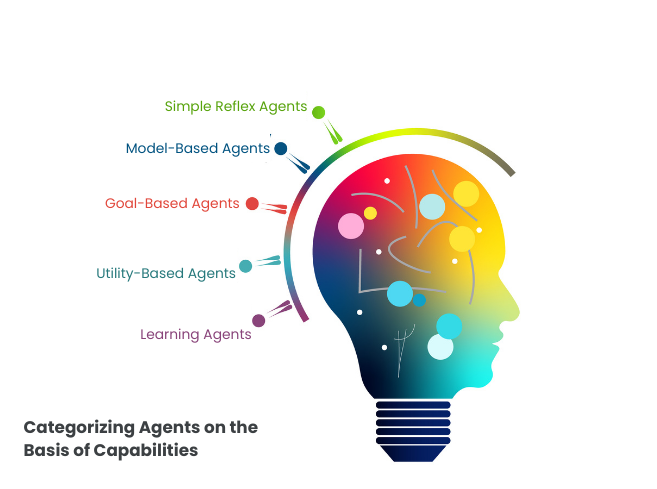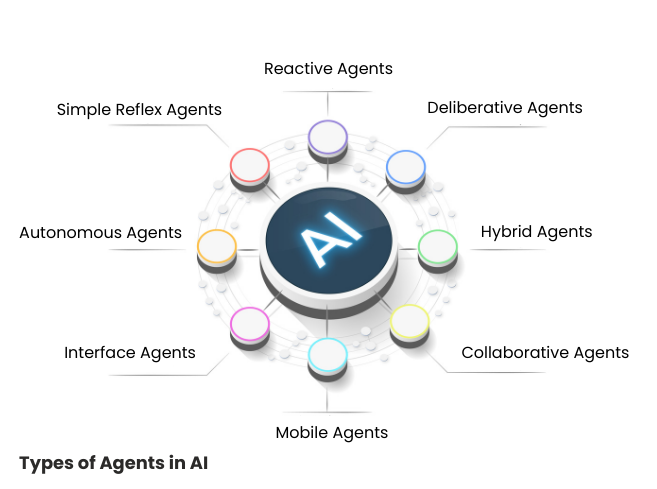AI Agents are emerging as a transformative force, reshaping how businesses operate, innovate, and scale, in the rapidly evolving landscape of information technology. Vee Technologies believes that the future of IT lies not just in automation, but in intelligent delegation and incessant evolution. This blog explores one such innovative endeavor - the concept of Agentic AI, its foundational principles, and its implications for enterprises navigating the digital frontier.
Understanding AI Agents
So, let’s describe an AI Agent as a software entity capable of noticing and analysing its environment, making decisions, and taking actions to achieve specific goals. Now, traditional automation tools follow predefined rules. In contrast, AI agents are dynamic, adaptive, and increasingly autonomous. Interaction with users, systems, and other agents to solve complex problems—often without direct human intervention, is what AI Agents offer.
Designed to mimic human-like decision-making processes, using data, algorithms, and contextual awareness to act intelligently, AI agents are already seamlessly embedded in a plethora of sectors, driving efficiency and innovation, right from customer service bots to supply chain optimizers.
What is Agentic AI?
Agentic AI refers to a new class of artificial intelligence systems that exhibit astonishingly proactive, goal-driven behaviour, going beyond mere reactive responses. These systems anticipate needs, plan strategies, and execute tasks independently, instead of waiting passively for instructions. As has been aptly described, this marks a shift from automation to agency, literally translating to machines are now entrusted with intent.
Generative AI, as we know it, creates content based on prompts. Agentic AI, on the other hand, understands objectives, decomposes them into actionable steps, and orchestrates tools to achieve outcomes. A helpful assistant and a self-directed colleague? Hard to compare!
The Rise of the Autonomous Enterprise
As Agentic AI is being progressively integrated, it is ushering in the era of the autonomous enterprise. In finance, they are now monitoring compliance, detecting anomalies, and initiating remediation workflows. In manufacturing, these AI Agents are optimizing supply chains, that too, in real time. In HR, they are progressively identifying skill gaps and even recommending personalized learning paths. Instead of just supporting operations, these agents are actually redefining them.
With all this going on, Vee Technologies is envisioning a future where AI agents become the connective tissue of the enterprise-linking systems, surfacing insights, and driving decisions across silos. This isn’t simply about doing more of what we did in a better way. Rather, it’s about doing what was previously impossible in its entirety.
Intelligent Agent in AI: The Core Concept
Defined by its ability to perceive, reason, and act, an Intelligent Agent in AI operates within an environment, gathers data through sensors, processes information, and executes actions via actuators. What’s remarkable is its capacity to learn from experience, adapt to changes, and optimize performance over time.
Based on their capabilities, these agents can be thus categorized:
Simple Reflex Agents: Actions are based on current perceptions.
Model-Based Agents: Maintain internal models of the world.
Goal-Based Agents: Make decisions to achieve specific objectives.
Utility-Based Agents: Optimize actions based on utility functions.
Learning Agents: Improve performance through learning mechanisms.
Each type plays a unique role in building scalable, intelligent systems that align with business goals.

Types of Agents in AI
Understanding the Types of Agents in AI is crucial for designing effective solutions. Here’s a breakdown:
Reactive Agents: Respond to stimuli without memory or learning.
Deliberative Agents: Use reasoning and planning to make decisions.
Hybrid Agents: Combine reactive and deliberative approaches.
Collaborative Agents: Work with other agents or humans to achieve shared goals.
Mobile Agents: Move across networks to perform tasks remotely.
Interface Agents: Interact with users to assist in tasks.
Autonomous Agents: Operate independently with minimal human input.
From IT operations and cybersecurity to healthcare and logistics, these agents can be deployed across domains, each tailored to specific use cases.

Agentic AI vs Traditional AI
Mostly rule-based and task-specific, traditional AI systems excel in narrow domains but lack adaptability. Agentic AI, on the other hand, is designed for autonomy, scalability, and collaboration, understanding high-level goals, breaking them into sub-tasks, coordinating with other agents, and adapting strategies in real time - all in a day’s work!
Challenges in Adopting Agentic AI
This major switch, however, is going to require rethinking IT infrastructure, data integration, and governance models. Deploying agentic workflows demands orchestration frameworks, robust error handling, and human-in-the-loop oversight.
Categorically, despite its promise, Agentic AI adoption faces following major hurdles:
Infrastructure Upgrades to support agentic workflows.
Great Data Quality is essential for effective agent performance.
Security & Compliance: Autonomous agents must operate within legal and ethical boundaries.
Trust & Transparency: Agents must explain decisions and align with human values.
Change Management at various levels.
At Vee Technologies, we help clients navigate these challenges through strategic consulting, robust AI frameworks, and continuous training.
Agentic AI in IT Services: A Strategic Imperative
According to expert predictions, businesses are increasingly turning to service providers for guidance on AI integration. The complexity of these tools and the need for secure, compliant AI strategies have created demand for expert consultancy.
Agentic AI fits perfectly into this narrative. It offers Productivity Gains, automating routine tasks and enabling strategic focus. We can expect Cost Reduction through streamlining operations and minimizing errors. Also, we’ll have Enhanced Decision-Making, providing real-time insights and recommendations. Last but not the least, we will experience Security Awareness, by embedding compliance into autonomous workflows.
Human + Agent Collaboration: The Future of Work
The fear that AI will replace humans is perhaps more of a myth than reality. Agentic AI is designed to elevate human work-not eliminate it. Agents free professionals to focus on creativity, empathy, and strategic thinking, by handling repetitive tasks.
Think a marketing strategist facing all the customary challenges in his day-to-day life. Now, imagine him working with an AI agent that analyzes customer behavior, crafts personalized campaigns, and adjusts pricing dynamically! Or visualize a healthcare administrator having an agent manage patient records, schedule appointments, and flag anomalies.
Such support would promptly redefine productivity and innovation.

Designing for Trust and Impact
Organizations must design for trust, if we wish to fully harness Agentic AI:
Transparent Reasoning: Agents should explain their actions.
Ethical Alignment: Training must include values, not just data.
Governance Models: Autonomy must be bounded by accountability.
This is not just a technical challenge – it’s a leadership imperative. Building trust in AI systems is essential for long-term success.
Shaping the Future with Agentic AI
Agentic AI entail a philosophical shift in how we think about intelligence, work, and collaboration. It is not just a technological advancement. As we move from automation to agency, the question is no longer whether we will use AI agents, but how we will shape them to reflect our values and aspirations.
At Vee Technologies, we are committed to guiding enterprises through this transformation - empowering them to build intelligent, ethical, and scalable systems that redefine what’s possible in IT.




